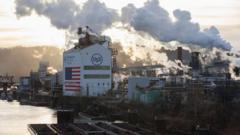The Biden administration has officially halted Nippon Steel's proposed acquisition of US Steel, a move that stems from national security concerns associated with foreign ownership of a pivotal industry. The $14.9 billion deal, projected to bolster US Steel's financial standing amidst competition, was met with significant opposition from the United Steelworkers union, reflecting broader political dynamics as the 2024 presidential election approaches.
Concerns regarding the acquisition have polarized opinion among various stakeholders. Supporters of the deal argued that it could be crucial for US Steel to remain competitive, especially given the firm's warnings about potential plant closures without substantial investment. Meanwhile, local politicians and workers feared that Nippon Steel’s ownership could lead to job cuts and a decline in production levels. In contrast, other business leaders cautioned that Biden’s decision might create a chilling effect on international investments in the US.
Despite potential diplomatic repercussions with Japan—a key ally—Biden leaned towards a firm stance concerning domestic industry and jobs. He articulated the essential role of steel in the nation’s infrastructure and defense sectors, emphasizing the necessity of maintaining US ownership to ensure stronger supply chains and a resilient economy. His statements stress the administration's commitment to securing American working-class interests.
The political narrative surrounding the deal may reflect broader themes in US economic policy, particularly within the context of Trump-era agendas that prioritize American manufacturing and patriotism in trade practices. Professor Stephen Nagy of the International Christian University in Tokyo noted that the decision aligns with a long-standing promise of Biden's administration to advocate for a "foreign policy for the middle class", highlighting the delicate balance between fostering international relations and safeguarding domestic industries.
In the wake of the decision, both Nippon Steel and US Steel have indicated they might contemplate legal action against the government. As political and economic implications unfold, the situation underscores the complexities of navigating a globalized economy while prioritizing national security and domestic employment.
Concerns regarding the acquisition have polarized opinion among various stakeholders. Supporters of the deal argued that it could be crucial for US Steel to remain competitive, especially given the firm's warnings about potential plant closures without substantial investment. Meanwhile, local politicians and workers feared that Nippon Steel’s ownership could lead to job cuts and a decline in production levels. In contrast, other business leaders cautioned that Biden’s decision might create a chilling effect on international investments in the US.
Despite potential diplomatic repercussions with Japan—a key ally—Biden leaned towards a firm stance concerning domestic industry and jobs. He articulated the essential role of steel in the nation’s infrastructure and defense sectors, emphasizing the necessity of maintaining US ownership to ensure stronger supply chains and a resilient economy. His statements stress the administration's commitment to securing American working-class interests.
The political narrative surrounding the deal may reflect broader themes in US economic policy, particularly within the context of Trump-era agendas that prioritize American manufacturing and patriotism in trade practices. Professor Stephen Nagy of the International Christian University in Tokyo noted that the decision aligns with a long-standing promise of Biden's administration to advocate for a "foreign policy for the middle class", highlighting the delicate balance between fostering international relations and safeguarding domestic industries.
In the wake of the decision, both Nippon Steel and US Steel have indicated they might contemplate legal action against the government. As political and economic implications unfold, the situation underscores the complexities of navigating a globalized economy while prioritizing national security and domestic employment.

















